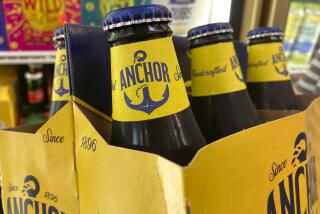Heavy Debt Is Casting Shadow Over Brewer
- Share via
MILWAUKEE — Analysts paint a bleak future for G. Heileman Brewing Co., the nation’s fifth-largest brewer and a big holding in the troubled empire of Australian industrialist Alan Bond.
Bond on Tuesday unveiled a complex series of corporate maneuvers, including the planned sale of half his Australian brewery holdings, aimed at dealing with problems posed by the reported $4.6-billion debt that he ran up building a brewing, natural resources and media empire.
One major holding is Heileman, which Bond acquired in 1987 for about $1.3 billion. In announcing his plans, Bond deferred for 12 months any decision to part with Heileman, a sale that analysts said could end up being unprofitable.
While the overall beer market has stagnated, Heileman’s share has eroded, falling from a high of 9.4% in 1983 to its current 7%. Industry observers say Heileman was worth far less than $1.3 billion when Bond bought it, and he will have a hard time fetching that price now.
“You’re not getting anyone to pay $1.3 billion for the breweries,” said Ben Steinman, associate publisher of Beer Marketer’s Insights, an industry newsletter.
“The question is whether you operate it and bleed a little or take a big hit and move on,” said John Collopy, an industry analyst and chairman of the Milwaukee investment firm Cleary Gull Reiland McDevitt & Collopy Inc.
Analysts point out that sales for Heileman--whose brands include Old Style, Lone Star, Special Export and Colt 45 malt liquor--started to slip before Bond acquired it but that former Chairman Russell Cleary had been able to keep the company efficient and profitable.
Discouraged by Problems
“His helmsmanship helped hold it together better than anyone could,” said Collopy. “When you lose that, the underlying softness got exaggerated.”
Cleary, who built the company into a national power through a series of acquisitions, says he is discouraged by the troubles that Heileman has encountered since the Bond buyout.
“It’s unfortunate,” Cleary said in a telephone interview.
More to Read
Inside the business of entertainment
The Wide Shot brings you news, analysis and insights on everything from streaming wars to production — and what it all means for the future.
You may occasionally receive promotional content from the Los Angeles Times.










